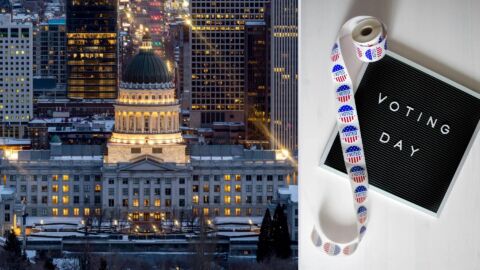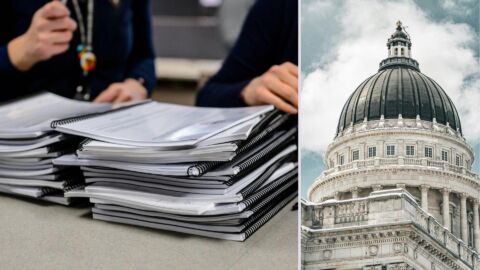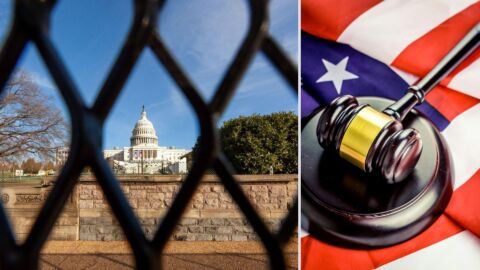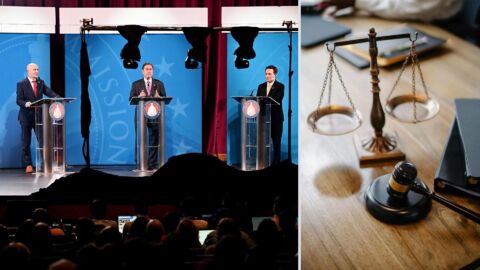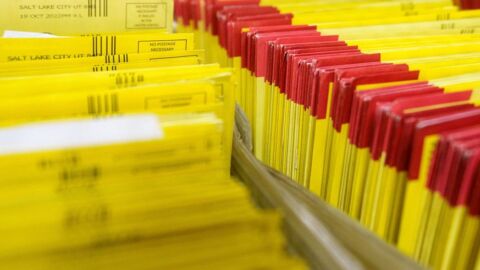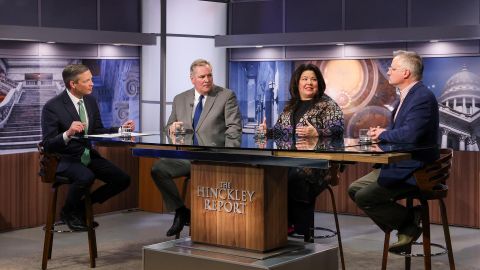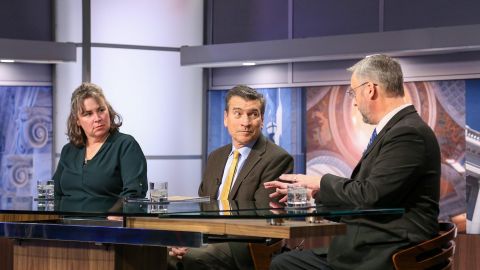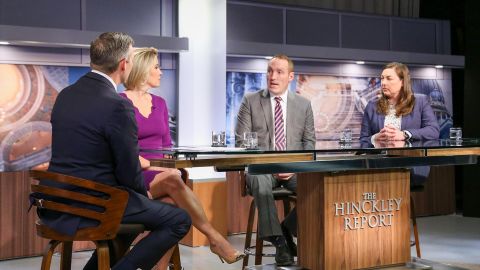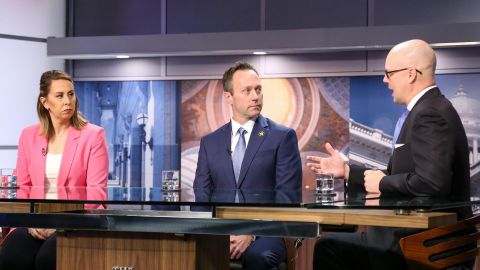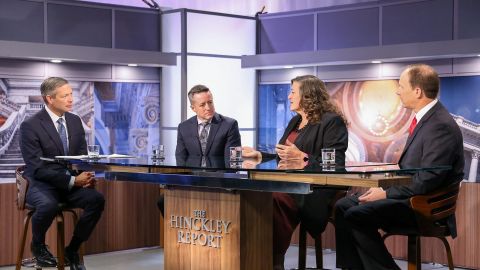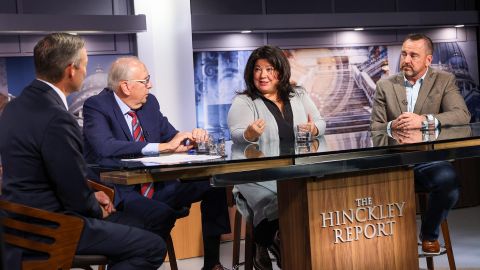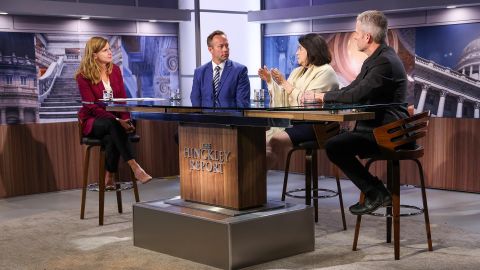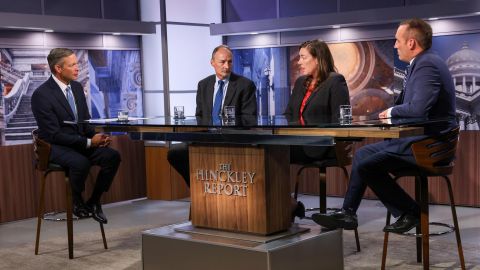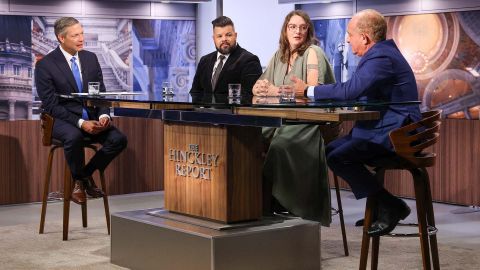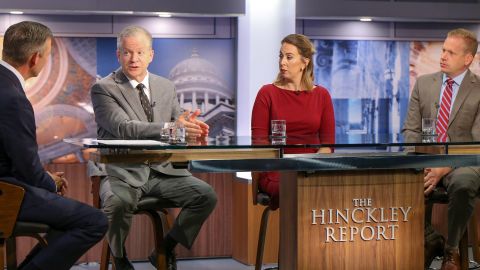♪♪♪ male announcer: Funding for "The Hinckley Report" is made possible in part by Merit Medical and by contributions to PBS Utah from viewers like you.
Thank you.
♪♪♪ ♪♪♪ Jason Perry: Good evening and welcome to "The Hinckley Report."
I'm Jason Perry, director of the Hinckley Institute of Politics.
Covering the week we have Salt Lake City representative Jennifer Dailey-Provost, Minority Whip in the Utah House; Greg Hughes, co-host of the Rod and Greg Show; and Damon Cann, political science professor at Utah State University.
I'm so glad to be with you all for this episode of "The Hinckley Report."
I wanna jump right into what just happened this last week.
We had a vice presidential debate, the only one we're probably going to see of these two candidates.
And Representative, I wanna start with you on this because the questions come up, you know how impactful is a vice presidential debate?
We may put it in context for this one maybe versus past.
Jennifer Dailey-Provost: I think that historically, we've not seen it be hugely impactful as far as outcomes.
I think that it is hugely impactful for people who are really vested in--who are already really vested in the election, especially if after the fact, their candidate appears to have won or lost the debate.
And it, you know, it reinforces a narrative that people really want their candidate to be doing well.
This year, I think is--it's different.
It's so different because of the the timing on the exit of Joe Biden from the race and the late entry of Vice President Kamala Harris as a presidential candidate, and so much media in such a short period of time in her selection of Tim Walz as her running mate.
And so, I think it has captured the imagination more than vice presidential debates in the past.
Because we just know so little about most--people know so little about the candidates.
And we, they haven't had, especially for Kamala Harris and Tim Walz, they haven't had the years of repetitive news stories like with the, you know, with Trump, the--it's just a--it's a different dynamic and it's interesting.
Jason: Greg, talk about whether or not it won people over or not because it's true.
We, you know, some people have heard these names, Tim Walz, newer on the national stage gave his position.
Were many people convinced to, you know, to vote in a different way or did it just confirm where they were already?
Greg Hughs: So look, I think historically, it's exactly right.
I don't think any presidential--vice presidential debate has ever determined the outcome of a presidential election in and of itself.
So, it--you have to take it in that context.
It had a national viewing of, I think about 43 million people.
I think the average has been about 50 million for those types of debates.
But where I think people really know where they may be in this election and we're talking about a very small population of undecideds and how you're undecided at this point, I don't know.
But if you are, I think that that debate could have a lot more sway than it normally would just because these are familiar, you know, the narratives are familiar, the candidates, this is an administration that we've had for four years.
You uniquely have someone running that was--served and had an administration in the four years prior.
So, you can compare the two.
So, there's a lot of information out there.
These two candidates, I think this was an opportunity for both of them to introduce themselves to the country.
And now in 2024 you get the clips.
So if you didn't watch it, you can watch just different interactions and different answers and draw conclusions from that.
So, I think, and I particularly liked the substance of this debate.
So, I think it does have the chance with a very small group of Americans that might not know how they want to vote yet, but they're small.
This could sway those numbers and I think it's gonna be a close election, I think it does come down to a very small number of voters.
Jason: I wanna get to the substance of it in just a moment, but we're gonna lean on the political science professor for a moment with you, Damon, if that's okay too.
Put this into context about the impact it might have particularly given that usually, I guess historically, for the past many, many years, these debates have been put on by the commission on presidential debates.
That was not the case this time.
Talk about what the future of these debates might look like and whether or not they'll happen or who might be in charge of putting them together.
Damon Cann: Yeah, no candidate has dared to defy or ignore the invitation of the commission on presidential debates in a very long time.
And so, it's kind of a landmark in presidential debates.
That said, I think there was enough political pressure from the public that the candidates felt.
I think both candidates in this race at the presidential level felt like they had a potential to gain from having a debate and from being out there in the public.
And that being the case, they didn't want to avoid the debate process.
I think it's tough for candidates in the future to say that they don't want to debate.
But the challenge in the future is going to be without the coordinating of the commission.
How do they agree on terms, rules, venues, and the like to make sure that that valuable resource continues to be available to voters.
Greg: And I'm gonna say that absent a process like that.
I don't think you'll see another debate because the way those were negotiated and the product you got by way of the quality of the debate or some are left feeling like moderators were not calling balls and strikes necessarily, there's cynicism to that.
And I don't think you'll see, in this case, it was President Biden that said I'm not doing the presidential debates.
We're gonna negotiate our own venues, you know, networks, things like that.
I don't know what the upside would be to engage in something like that.
If it's not done through a commission where you're doing your level best to make sure everything is as fair as you can make it.
Not that that's always been the case, but compared to what we just lived through, I think it was a much more fair process than the one we saw now.
Jason: So interesting because usually we have three presidential debates.
I know we were supposed to have one here on campus.
It would have been next week if they have gone through that and one VP debate.
I wanna get to the substance of this for just a moment.
I wanna show a clip, sort of a synopsis of the debate itself, and get some of the key takeaways.
Let's roll that clip.
Julia Benbrook: Ohio Senator JD Vance and Minnesota Governor Tim Walz stepped on to the debate stage while major stories developed both at home and abroad.
The vice presidential nominees were asked to address climate change as the Hurricane Helene recovery efforts continue.
Tim Walz: There's no doubt this thing roared onto the scene faster and stronger than anything we've seen.
Senator Vance has said that there's a climate problem in the past, Donald Trump called it a hoax.
JD Vance: If they really believed that climate change is serious, what they would be doing is more manufacturing and more energy production in the United States of America.
Julia: Hours before the debate started, Iran launched a missile attack against Israel.
Vice President Kamala Harris joined President Joe Biden and top military officials in the situation room to monitor the response by Israeli and US forces.
Harris's running mate arguing that what is needed is steady leadership.
Tim: What we've seen out of Vice President Harris is we've seen steady leadership.
We've seen a calmness that is able to be able to draw on the coalitions to bring them together.
Julia: Meanwhile, former president Donald Trump criticized the Biden administration and claimed that this would not have happened if he were president.
His running mate making the argument that Trump would bring back stability.
JD: Donald Trump recognized that for people to fear the United States, you needed peace through strength.
Julia: Reporting in New York, I'm Julia Benbrook.
Jason: Representative, key takeaways.
Jennifer: So, what I actually really liked about this debate is it felt like a sincere debate.
You know, it's--I think the public loves when there are sensational things that happen and key in on really weird things or sensational things that candidates might say and lose track of the substance of the debate.
And whether you agree with either candidate or not, I felt like it was civilized and it was substantive and it gave the opportunity, you know, as we discussed earlier for the public to get to know the candidates.
And I really--I'm grateful for that.
I hope that it resonates and resonated with people across the country.
But at the same time, you know, we thrive on a little sensationalism.
So, maybe we need to up our game and have harder conversations.
Jason: Interesting, Greg, I wanna get your comment on that too.
But to this point also, I mean, some of the news stories about this whole debate was not so much about the content, but about there was some civility in this.
That's interesting that that was a story.
Greg: And it came on a day where it was a pretty rough day globally.
You have the Iran missile strike against against Israel.
You have the Hurricane Helene and all the carnage going on at that time.
You had a pending strike of longshoremen which would impact 36 ports and our economy in a significant way.
It would have been very hard for, I think viewers or just this country to have two vice presidential nominees yelling over each one of each other trying to make a point on a day that felt as chaotic as we're gonna get.
So, I think that it was, I was grateful to hear a debate that was more respectful and they could really get drilled down on those issues, especially given that we're--it feels like we live in pretty chaotic times and that day particularly felt pretty chaotic.
So, kudos to both candidates that they really did, I think address those issues in a substantive way.
And I don't think there was--they didn't hug it out.
I just think they were very direct and I think that that's the upside.
The downside for me is going back to just even the format.
If you ask, I think if you ask Americans right now, inflation, kitchen table issues, the cost of living, or housing, or public safety, immigration is an issue.
They're talking climate change, they're talking I mean, the things that they were drilling abortion, they're not that these issues aren't important.
But if you look at every poll in America, what is front of mind right now?
I found that these moderators were not getting down to the most critical issues that really, we would have liked to see these candidates explore and maybe articulate the differences between.
And so, I was disappointed in the questions, and how they were asked or how they were framed.
And I think that, that could have been given how the tone was a better debate than we got.
Jason: Damon, your perspective and, you know, maybe through the views--the view of Utahns who are watching this debate.
Damon: Yeah, so, I think there were some really interesting things.
I thought there was some good substance.
One thing that I appreciate both of these candidates have had some controversies about previous statements that they've made about aspects of their bio, or the relationship with these candidates that they now share a ticket with.
And I love that the moderators were willing to get in and ask those questions not because it had the view of a "gotcha" kind of stance, but because the moderators wanted to give the candidates a chance to say what they--to explain how they think about these things and why they've said or done things that they've done in the past.
And so, I really appreciated that context and I thought it was a very helpful debate in that regard.
Jason: I wanna talk about something that has come after the debate not just about the vice presidential candidates, but about the presidential candidates.
These are these interesting endorsements that have been coming for these candidates.
And we've seen some, I'm so curious how they resonate with Utah.
So, I'll give you a couple.
Jeff Flake this week has endorsed, you know, Vice President Harris for president.
There's a Republicans for Harris and Liz Cheney is working on the campaign.
Greg: Don't forget her dad.
Jason: Okay.
Jason: You--oh yeah, go ahead, Greg--you start us off.
Greg: Democrats now have the Cheneys.
They got Dick Cheney and they've got Liz Cheney all on their side.
That is a--that's an odd relationship and I wanna see in real time how the Democrats embrace the Cheney's after all these years.
It's my memory that they were pretty critical of the Cheneys and the Bushes when they were in office.
I'm frustrated by some of this and that look, if you wanna make a case for Kamala Harris and your senator, former Senator Jeff Flake, Ambassador Flake, make it.
But if you make it on the, on the grounds of morality alone, having served with Kamala and having served with Walz, there's a lot you're not including.
I would--I think there's a lot that is pretty tough to argue just on pure morality only on a ticket that is as aggressive on abortion as this ticket is, and Kamala Harris says she's left to Bernie Sanders in terms of her legislative votes and her conduct.
A lot of that isn't the view that we have or we would want from society or what we would think is actually immoral.
I just think that some of those banners that people are making those endorsements around are not authentic to me.
I think Jeff Flake is angry that he didn't feel like he could run for re-election in Arizona because he and Trump didn't get along and I think there's some animosity there because of that.
I think that's actually Liz Cheney's issue too.
But--but anyway, I don't know that endorsements dictate that and I think we've made very strange bedfellows with some of these endorsements that have come down the line which should confuse people more than confirm an opinion.
Jason: Damon, give us some perspective on this because these are some names that Utahns tend to recognize.
Damon: Yeah, they are.
I think it's more reflective of the fact that there are some Utahns who have had some skepticism for Trump more so than you would see in most red states.
And I think it's the same process that's generated that skepticism for Utahns that has for some of those Utah Republicans, that generated it for people like Jeff Flake.
At the end of the day, though, endorsements really, the political science literature shows that endorsements matter most in low information environments where people don't have a lot of other cues on how to vote.
We are operating in a massively huge information environment here where people have enough information about Donald Trump and Kamala Harris to make up their own minds.
As a result of that, I wouldn't expect these endorsements to make a lot of difference.
I think it's just a statement of conscience for the people who are making them.
Jason: So, Representative, for the Democrats, they're gonna, you know, take these names.
Jennifer: Well certainly because I think that it demonstrates how key it can be to be a free thinker and to not fall in party lines because there is certainly a narrative that the Republican Party has left a lot of its stalwart, you know, members behind and as it's changed its tenor, as it's changed its priorities, but I wanna push back on this, you know, this insinuation that there's a line in the sand that Kamala Harris's stance on reproductive autonomy is a morality issue.
And that Jeff Flake is somehow left behind his moral stance by supporting that because that is certainly a subjective issue.
Not as objective as my friend Greg would insinuate.
But I think honestly, I think they, I don't disagree with Damon, but I do think that these endorsements are more important than maybe some here believe because I think it tells people that if they're on the fence and they are Republican, they're lifelong Republicans.
They believe in the old fashioned GOP Republican party, but they feel that their candidate now is--has left them far behind that it is okay.
You can still maintain all of your Republican values and support a candidate like Kamala Harris because she actually is very moderate and yes, politicians, their stances evolve, their opinions evolve.
If you are not taking new information and learning new facts and changing your mind based on new information, then you're not a very good politician, you're not being responsive to the facts.
And I think that it is perfectly valid for the Cheneys and Jeff Flake and any Republican to say this is about the actual morals of the candidate and not some perception of I'm right and you are wrong.
Greg: If Kamala Harris could articulate, I've changed my positions as you you've just done, I don't think you've even heard that from this Democrat nominee that she has gone away from the New Green deal and she does support fracking and oil and gas drilling in Pennsylvania as she is saying that in Pennsylvania to attempt to win that state.
Talking about being pro-Israel but not wanting to offend the pro-Palestine or Hamas faction that would be in Michigan or some--one of these other critical battleground states.
I think she's having a hard time articulating issues or where she has moved on issues because her base of voters beyond just hating Trump, they have very different objectives and for her to earn people's votes, she has to say kind of different things in different states.
If it was the case that as you get more information, you start to center on some--a new position, one that you didn't have before.
I think that would be a welcome sentiment from the Vice President--Kamala Harris.
But I don't hear that.
It--so I agree with that but I just think there's more situational logic and outrage going on than you'd like to see.
But that's campaigns, elections.
Jason: Okay, I wanna move on just a moment because we had a very interesting speech from our lieutenant governor.
It was at the Hinckley Institute of Politics this week where she's talking about election security.
We're about just over a month away from our election.
We're gonna start seeing some of the ballots coming out, you know, in our mailboxes very soon.
So, Damon, I wanna talk to you about this one first for a second because it's interesting timing.
Lieutenant Governor, of course, is the elections officer for the state of Utah.
I wanna first start with a clip from the lieutenant governor from her speech where she decided to talk about election security and where Utahns are.
Get your take after we get this sound bite from her.
Deidre Henderson: It is just not politically popular, especially for someone in my political party to stand up for elections.
It's just not, and so, you know, that--we don't score political points by speaking truth in elections in my party and that's hard.
Jason: Go on, Damon, please.
Damon: So, I think where the lieutenant governor is coming from on this is that surveys nationally and one that I did recently with some colleagues at BYU, Quinn Monson, and and Weber State Liam Murray, focused on Utah, show that Democrats have higher levels of trust and confidence that their ballots will be calculated--counted correctly than do Republicans.
The gap in Utah isn't massive but it's present.
And so, I think she's speaking a little bit to that fact.
That said, our lieutenant governor, our governor, and a great many others around the state of Utah have stood up for what the excellent work that our county clerks and other election administrators have done.
I don't think they've paid a price for doing so, but I'll say I have, you know, great respect for the work that our election officials do in Utah and nationally.
And I think the more people that look closely at what these processes really are, how they really work, Republican or Democrat comes out of that experience having a great deal of confidence in our election processes.
Jason: Damon, why do you think she's doing this right now?
Sort of, this speech about reaffirming how, you know, secure these elections are for Utahns specifically.
Damon: You know, I'm not sure that there's something that novel about this messaging for her because it's something that she's been speaking out broadly on for a period of time.
I think it might be getting a little bit more attention right now simply because it's election season, and people are paying attention, and we're still seeing some dialogue and rhetoric up to the presidential level in this presidential candidate level in this country about the security and integrity of our elections.
And I think she wants to stand up for her office and for election workers across the state of Utah in emphasizing the quality of work that they're doing here.
Jason: Okay, let's get the Republican, the Democratic perspective on this as well.
She's a Republican charged with this responsibility.
Jennifer: So, I've had the privilege of serving on government operations in the House my entire legislative term for the last six years and have the--had the good fortune of working with the lieutenant governor's office and her elections team.
I have found her to be very honest and straightforward and very committed to the mission that she is tasked with.
And the lieutenant governor is the head elections officer in our state.
That is one of her primary, if not her primary role as lieutenant governor.
And she has from the get go been very, very keyed in to the integrity of the elections and has done it under fire most of the time, I think unfair fire, you know, leveling criticism against her, against her office, against the clerks, because of some, you know, this perpetuation of, you know, voter fraud that has never been proven to be in any way substantive or real, but it somehow just continues to be this narrative led by, you know, Trump and a lot of his supporters, and she has much to her credit really stayed the game, stayed true to the integrity and the job that she has, worked with the facts, been honest about what the reality is.
And yes, she is a Republican and yes, I am a Democrat, but I have found her integrity and her leadership in that office to be flawless.
Greg: So, what you're hearing is, this is a very personalized issue.
So, you hear a lieutenant governor talking about the security of our elections.
And in her statement that defending our elections process is not popular in Utah, I could not disagree more.
The--what we're talking about is and when I served as a public servant, I would never tell you that our processes in government are perfect or that they have no problems or that there aren't things going on that are anomalies or irregularities that we have to look at.
Government is not a perfect thing and and its processes are not.
The way you solve that is transparency.
It's always been put the bright lights of transparency on your process.
So, when it comes to elections, chain of custody, transparency, if we can improve in any of those areas, and there's been audits that have given recommendations and findings to say we can be--the state of Utah can do this in a more transparent way.
That is not an indictment on our lieutenant governor.
That did not mean that she's not an honest person.
But if her position is to even ask or to want more transparency is an attack on her or her office, it just simply is not.
We found in that recount of the congressional race over 700,000 people voted and it came down to 146 votes.
So there was a recount.
What did they learn?
They found out not in numbers that may, well, it might have changed the outcome.
We'll never know.
But what they found is some of the ballots that had been adjudicated in a number of counties--clerks, when they submit them, there was a glitch and it wasn't counted, and that was only found because they had this recount where that was the case.
They were able to fix that.
We have learned that the ballots if you live in Beaver County or South, in Utah, that is processed in Clark County or Las Vegas, Nevada.
And so, you had some ballots where people voted, and votes of conscience, they filled it out.
But because there were multiple stamps on that ballot that made it impossible to read the date, they were thrown away.
And we need to to find--when we learn that we need to improve that process.
And if somebody did go to the effort of voting and if that stamp isn't able to be seen, let's at least articulate why that should be thrown away so voters know or it--we keep it because they voted and lean on the side of the voter.
But those are the types of issues that all government, not specific to just the state of Utah, but all government processes should be open to that kind of level of scrutiny and being willing to and challenging that or wanting that is not an attack on any individual person.
Jennifer: But you just reiterated the exact case.
You said the prob--we if we wanna look at the processes and if we find irregularities, but it was the process itself that found the irregularity and it was corrected.
And so, saying that, that she is being dishonest because she no, let me finish because she is asked for more transparency.
Every single clerk has responded to my knowledge for request for transparency every single time.
And so, for people to go in and say, I want more transparency on this and the clerk to say, okay, here you go.
And the outcome still be the same.
It's the outcome that people want changed, not the transparency.
They're just using that as a wedge to try to force.
Greg: I don't disagree with your sentiment, but I think my point is this, you had to have like a-- what was it?
A 0.5% to even qualify for that recount.
Prior to that recount, we were told that these processes are without air, they are without a problem.
That unique situation did allow for some additional scrutiny.
I think where the suspicion just rises even by perception is if we're saying this whole system is fine, it isn't wrong.
We're not doing it in a way that's--we're doing it accurately, it's safe, you can depend on it.
But as you look at that in that case, there were things that were different than the way it's been described as a process that doesn't have those types of problems.
There were problems.
Just be open to that, always be and keep that I would--take for instance, the signatures to qualify for the ballot.
I don't know when that law changed because those used to be public records that you could see the signatures of those that qualified.
That isn't a public record anymore.
And I don't know that that serves to raise the level of confidence with the public in our elections process.
Those things is what I'm arguing should be far more transparent than we have right now.
Jason: It's gonna have to be the last word on.
Sorry, we'll get back to you professor on the next opportunity.
Thank you so much for your insights this evening and thank you for watching "The Hinckley Report."
The show is also available as a podcast on PBSutah.org, YouTube, or wherever you get your podcasts.
Thank you for being with us.
We'll see you next week.
announcer: Funding for "The Hinkley Report" is made possible in part by Merit Medical and by contributions to PBS Utah from viewers like you.
Thank you.
♪♪♪ ♪♪♪

